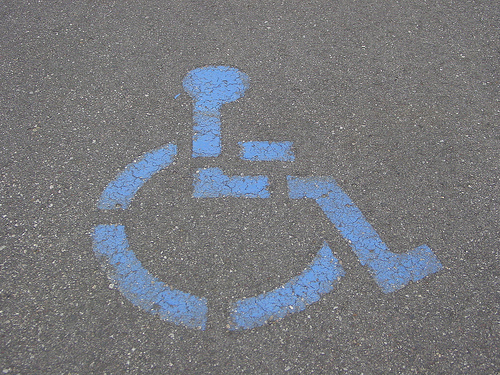This month, drivers in Chicago who slide into a metered parking spot and who neglect to feed it because their rear-view window sports the familiar blue disabled parking placards will be courting a $65 fine. That’s because Illinois state law now requires all placard holders to pay for parking, unless they use a wheelchair, can’t walk 20 feet, or have lost motor control in both hands. Those exempted from the law, which took effect on January 1, will receive new yellow-and-gray disabled parking placards.

From The Tire Zoo
The change supports the tough stand that Chicago mayor Rahm Emanuel has taken against disabled parking-placard fraud, which has included coordinating stings against motorists who abuse the system. The state has organized similar efforts; in November at the start of the holiday season, the police department of the Illinois Secretary of State canvassed shopping locations statewide to identify those who were misusing the placards.
In Chicago, abusers, such as those who drive with expired placards, are subject to a $250 fine for a first offense, while motorists who falsify placards or use the ones of deceased drivers are subject to a $2,500 fine and a one-year suspension of their license. (The fee schedule for similar citations issued by the state differs somewhat.)
The actions of the city and state align with those of others nationwide. Washington state lawmakers are currently developing a strategic plan to end disabled parking-permit abuse, while in Portland, Oregon, the city council will vote this spring to end free disabled parking in its downtown. Florida and New Jersey are likewise cracking down on disabled parking-permit abusers, while cities like Oakland are learning how much they lose in parking revenue to placard abuse. (In 2009, Oakland estimated such abuse had cost the city at least $150,000.)
In Illinois, the Office of the Secretary of State counted 299,530 disabled parking placards last year, which means almost 300,000 motorists were exempt from paying fees at parking meters statewide. That’s because state law formerly allowed cars that displayed the blue placards to park at meters for free for an unlimited time.
That law has meant cities and counties in Illinois have forfeited revenue—sometimes in the millions. For instance, Chicago Parking Meters LLC, a private business that leases meters in the city as part of a 75-year deal, uses a formula to calculate the revenue it loses to disabled parking. After revising its agreement with the company, the City of Chicago owed it $54.9 million for the use of disabled placards in 2012 and 2013.
That figure should drop in the future since the number of drivers who qualify for free parking with the disabled parking placards now stands at 30,510 statewide, a 90 percent decrease in the number of qualified drivers under the old law.
Related articles across the web